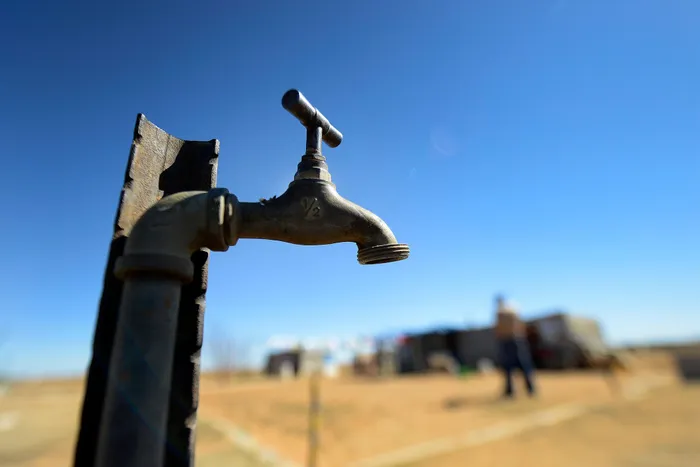Urgent calls for community engagement in KwaZulu-Natal's water master plan

KwaZulu-Natal is one of the provinces with the highest water losses in the country, with the 2022 and 2023 no-drop results indicating that the non-revenue water (NRW) averaged 52.6%.
Image: Paballo Thekiso / Independent Newspapers
KwaZulu-Natal is one of the provinces with the highest water losses in the country, with the 2022 and 2023 no-drop results indicating that the non-revenue water (NRW) averaged 52.6%.
This was higher than the global aggregate of 30% and was one of the water provision challenges the KZN Department of Cooperative Governance and Traditional Affairs (Cogta) stated when they presented their progress report on the KZN Provincial Water Master Plan (PWMP) to the KwaZulu-Natal Legislature Portfolio Committee on Tuesday.
Other challenges include no planned maintenance programme in relation to aging infrastructure, and also unplanned/reactive maintenance, which is mostly undertaken.
In its presentation, Cogta stated that drinking water quality management remains a challenge in the province, as 21 water systems were found to be in a critical state as per the Blue Drop results published by DWS in December 2023.
This has also resulted in a decline in the water quality in Amajuba, King Cetshwayo, uMzinyathi, and Zululand districts.
The department has implemented what they term seven pillars in response to some of the challenges. They are:
- Water resources programme.
- Water treatment, bulk distribution, and storage.
- Water reticulation programme.
- Water conservation/water demand management programme.
- Financial sustainability and revenue enhancement programme.
- Operations and maintenance programme.
- Human resources development programme.
In a brief presentation, the uMgeni-uThukela Water also highlighted several infrastructure projects in various stages of implementation, with the upgrade of the KwaMaphumulo treatment plant from 6 to 12 Ml/d and secondary bulk pipelines (9 Ml/d capacity) through the Mshwathi Bulk Water Supply Scheme (BWSS) in Ilembe District Municipality being one of them.
A presentation by the eThekwini Municipality Water and Sanitation (EWS) touched on the Water Turnaround Strategy and new bulk water schemes.
The strategy addresses 12 key areas of the water business over the short and medium term. A cornerstone of the strategy is to improve the financial position of EWS for the improved maintenance and replacement of assets.
Tim Brauteseth, MPL and DA KZN spokesperson on Finance and Standing Committee on Public Accounts (Scopa), was concerned about staff shortages in various entities and non-revenue water figures.
“There must be a clampdown on theft and vandalism of water infrastructure and reduction of algae in the system that is blocking pipes,” he said.
Bonginkosi Mngadi, MPL and uMkhonto weSizwe Party (MKP) member, called for more public hearings to listen to the plight of the people on issues of water.
Mngadi called for the prioritisation of boreholes throughout the districts, with emphasis on deep rural areas.
“There are issues of water being supplied by tankers that are using municipal budgets. We need to look into the possibility of boreholes rather than spend money on water trucks. Some of these trucks are travelling quite a distance to reach some areas. Harding is confronted with a drought, and bore holes will assist the residents,” he suggested.
Dr Celiwe Qhamkile Madlopha, ANC MPL, called for roadshows to explain to the public what the challenges are and what is being done going forward with regard to water supply issues.
“When the community raises challenges, they think it falls on deaf ears because they do not know about the good work being done to address it. I am concerned about service delivery on the ground and the grants not being spent,” she said.
Marlaine Nair, chairperson of the KZN Legislature Cogta Portfolio Committee, called for an updated water master plan so that progress can be tracked.
“The planned maintenance and slow implementation are serious concerns for us. Why are municipalities not rolling out plans in place?” she asked.
Otto Bonginkosi Kunene, an IFP MPL, was concerned about water and sanitation rollouts in the province, which he believed were critical in rural communities.
“Sanitation is dignity, it remains a slogan and not being felt in rural areas,” he quipped.
zainul.dawood@inl.co.za